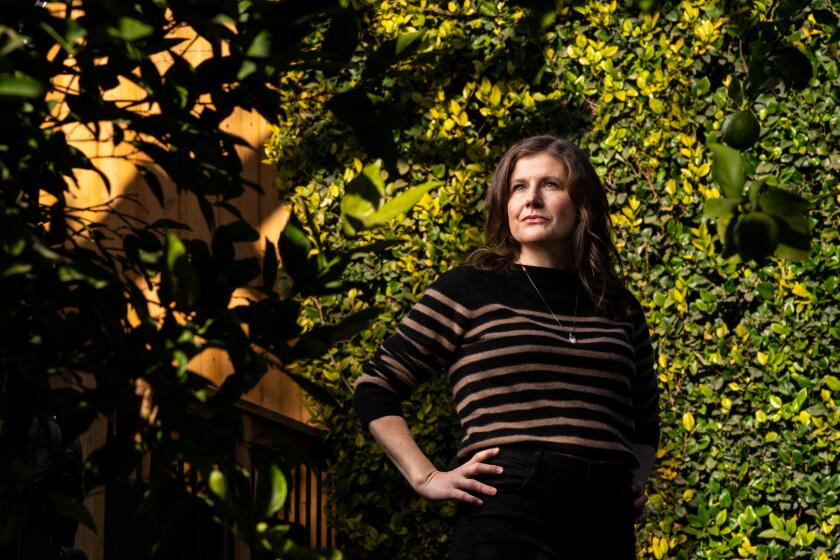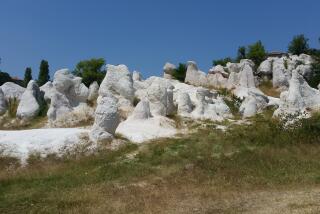Commentary: How ‘Dickinson’ perfected its 21st-century love letter to a 19th-century poet
- Share via
“Dickinson” is many things: a period drama, an irreverent millennial comedy, an eccentric family sitcom, a wildly imaginative feminist series and one of Apple TV+’s riskier productions. In its second season, which concludes Friday, the 21st-century love letter to a 19th-century poet has proven itself a very modern feat in creative storytelling.
And storytelling it is. There isn’t a lot known about the inner life of the revered American poet, a recluse who never married and for whom fame arrived decades after her death. The meticulously researched half-hour series, from creator and showrunner Alena Smith, fills in those blanks with real and imagined details about the young writer’s life at home in Amherst, Mass., with her dysfunctional family, diverse circle of friends and taboo love interests. The young folks may wear ribbons in their hair and top hats on their heads, but they speak in present-day slang, greeting one another with a hearty “What up!”
Season 2 continues the wild exercise over 10 episodes, earnestly honoring Dickinson’s poetry by bringing it to the fore while bending Victorian values and period-piece conventions into pop art.
Emily (Hailee Steinfeld) curses. She drinks. She’s emotionally volatile and she’s in love with her sister-in-law, Sue (Ella Hunt). She has grand visions and out-of-body experiences, joins séances and talks with Death (Wiz Khalifa). She is a walking bundle of conflict and drama. In conversation, Emily is blunt and straightforward, but painfully private when it comes to revealing her work. She wants to be read but she’s terrified that being published will break her creative spirit. Why is she writing: for love or fame? And oh God, all of a sudden she’s empty and hollow! A husk! “Writer’s block,” says Irish maid Maggie (Darlene Hunt) nonchalantly.
Glued to current events, Alena Smith, creator of Apple’s raucous period comedy, re-examines feminism, fame and Civil War through the eyes of her heroine.
The Dickinson household is its own strange ecosystem and it continues to grow and morph in Season 2 in unexpected ways. Emily’s sister Lavinia (Anna Baryshnikov) has gone from vapid princess to formidable young woman, pushing against her expected role as a proper lady. Clueless brother Austin (Adrian Enscoe) is now the conscience of the series. Emily’s duty-bound mother (Jane Krakowski) is questioning her purpose in life while her stern, traditionalist father (Toby Huss) is slowly changing his views thanks to the strong women under his roof. Each embodies the ideals of the era while simultaneously tearing those norms down. When mother speaks of disagreements with father, she says, “He makes me so angry I could, I don’t know, undust his study!”
The series’ 1850s come replete with a bumping soundtrack, gyrating dance numbers, yoga, diet crazes and characters who consult crystals for energy. The absurdity is as much a comment on today’s culture as it is a revisionist joke. A Season 2 trip to the day spa finds the Dickinson women paying absurd fees to bathe in a vat of mud, drink repulsive herbal tinctures, be doused with buckets of water and “cocoon” in freezing cold muslin wraps. All in the spirit of healing.
The show often does a better job satirizing today’s societal shifts — and racial and political divisions — than other TV comedies set in the present . And the Civil War is coming, so there’s plenty of grist about a “house divided.”
Critics of the series may take issue with the liberties with her story and her work. That is true, but the fictional flourishes are executed with such respect and reverence for the poet and her emotional ups and downs that one can’t help but fall in love with her quirks and flaws as she struggles mightily to stay afloat. Gender disparity is a heavy anchor and the menfolk often treat her as an inferior incapable of holding a thoughtful conversation, let alone as an author.
For years, observers have wondered what would seal the disgraced filmmaker’s fate. Kirby Dick and Amy Ziering’s four-part docuseries could be it.
But the joke is on them and we end up laughing. When Emily climbs into Death’s carriage for a drunken joyride, she meets the recently departed Edgar Allan Poe. He assumes she’s a groupie. But no, she’s only read “The Raven.” He looks deflated. “Oh, how I miss my cousin/child bride, Virginia,” he sighs.
“Dickinson” plays it loose with history, dropping in guest appearances by literary sellout Louisa May Alcott (Zosia Mamet), an obnoxious Henry David Thoreau (John Mulaney) and spacey Central Park architect Frederick Law Olmsted (Timothy Simons). Were they really like that? Apparently so, according to some historical accounts. “Dickinson” may not follow the facts to the letter, but it is still steeped in research about and appreciation for the poet, the era and her contemporaries, filtered through details that the show’s architects recognize might flip a switch with generations raised on social media gossip and bawdy reality TV. Let’s hope Season 3 brings a run-in with Herman Melville or Harriet Beecher Stowe.
The series masterfully connects the past with the present, showing how much has and hasn’t changed since whale oil lamps and horse-drawn buggies were all the rage. And why not? Emily was a woman ahead of her time. She fits in now. And so does “Dickinson.”
‘Dickinson’
Where: Apple TV+
When: Any time
Rating: TV-14 (may be unsuitable for children younger than 14)
More to Read
The complete guide to home viewing
Get Screen Gab for everything about the TV shows and streaming movies everyone’s talking about.
You may occasionally receive promotional content from the Los Angeles Times.








